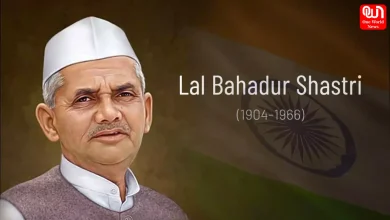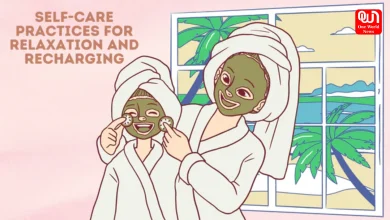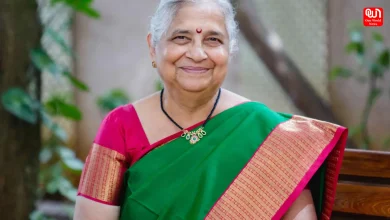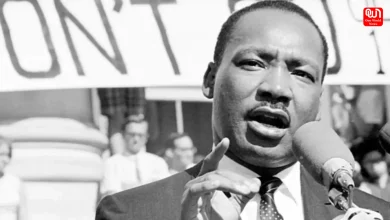4th Delhi literature Festival : Day 2

Anyone can connect with the book and it really appeals. It proves you can write simple English without bringing down your level. Write beautifully but write simply.- Madhulika
Any good story should be about the story. If the words get in the way of story, then you are not doing a good job. Words shouldn’t be so complicated that they break the flow of reading.

Madhulika
There is a difference between thinking of someone as a human and equal and treating someone as an animal and outsider. If the language you use is understood by everyone then they are familiar with it. If they do not understand, then they are animals who come at night and you communicate with them.
Following this, he read a few lines from his book – The storyteller’s tale.
His book is a historical story and he explained why we put in lot of details to revoke that era.
Initially it wasn’t written as a historical novel, he said. His editor suggested that he needs to make his characters real with more factual details.

Omair Ahmad
“I was working with my friend about looking at Delhi through the eyes of poets. They see a different Delhi bowing to Deewane aam. One of such poet is Ahmad chakdali, Ravi suggested thta we talk about him.”
“Collection of short stories is less acceptable than novels”, answered Omair Ahmad, when being asked on short stories relative to novels by Madhulika.
” This is part of a collection. It has to be a collection of two novellas and short stories. My publisher suggested that we split it apart and publish it in parts. My next one would be a second novella. “
” You should write how much is necessary but you should labour on it too,” Omair said. Sometimes it requires a thousand words to cover the subject and yet sometimes less is enough
Audience question
1. Does your torture comes in as you have laboured hard
These stories are about how you tell stories. Anyone who writes it is terrifying, the terror of the empty page. While telling a story you are trying to ask someone to accept a totally different idea in their mind. How will people receive it is a big question.
Somebody laughed at the intimate scene and I had to rewrite. When you create something and tell it, we are very afraid as to how would the person respond. If the person accepts, then it doesn’t put away the gear but actually raises the expectation.
2. Could a person still afford the arrogance of civilization in the 18th century ?
Even today there is that arrogance. No matter how far we fall we feel like ‘tees mar khan’. Civilization is actually defined by our manners, behaviour and so on and it takes a long time to build. We take the size of Delhi for granted, Delhi did built over time and although the empire might have weakened in terms of power, the rules of behaviour have settled in and are still with us. Delhi always has had and will have that arrogance.
Urdu session
Rakshandha Jalil and Rakhee Bakshee took the dias and gave special importance to the lost Urdu Literature. Rakshanda is an Indian writer, critic and literary historian. She wrote a book called, Invisible City- The hidden Monuments of India. She also works towards the popularisation of Hindi and Urdu literature and culture.

Rakshandha Jalil
The session had a vivid discussion about how technology has impacted literature. Rakshanda went on to say that it is a mercy that Urdu text and font is not on phones. She also mentioned that one shouldn’t ban things. “If you don’t like something, then turn the page. Don’t ban.” Raskshanda also went on to talk about how marketing sells a story.
How to maintain the sanctity and depth of a language was also discussed by the two ladies. Views were expressed about the young generation and how they were looking at Urdu literature. Rakshanda went on to appreciate the awareness the youth of today have. She acknowledged the growing number of poetry societies in Delhi and the good job they are doing.
There was a time when conversations used to happen in ‘Shayaris’,but, sadly enough one doesn’t see that happening nowadays. Discussion about the Progressive Writers Movement, the topic on which Rakshandha did her PhD was also the topic of discussion. Overall the session was a huge hit and the lost art of Urdu literature took the centre stage.
‘Populism of poetry’
Today is the second day of Delhi Literature Festival happening in Delhi Haat. It’s amazingly going on, third session was addressed by Richa Anirudh, News anchor at IBN7 and one and only Kumar Vishwas, the bestseller Hindi poetry in India.

Kumar Vishwas
Richa Anirudh is best known for hosting a show on IBN7 ‘Zindagi Live’ she has written a book named ‘School life’ in year 2014. Kumar Vishwas told that he is writing from last 20 to 25 years and he is a romantic person. Apart from his, political life. Some of his best selling books are Pagli Ladki, Tiranga etc.
Richa Anirudh requested Kumar to sing a song for the audience. He sang “Abhi abhi geet likha hai tumhe jeete jeete abhi abhi amrit chakha hai amrit amrit peete peete.”
Richa also asked him, which type of poet he is? As he writes romantic poem but he hs in politics?
He answered that no one likes to do politics but he came in politics to make it a better place. First poem that was written by him was Ghost writing.
Richa further asked whether poetry can be taught? Kumar replied no its not possible. Kumar is inspired by Kalidas, Keats, Nirala, Tulsidas. “Kavita ka bazaar bnaya but bazaar ki Kavita nai baniye.”

Richa Anirudh
He enthralled everyone present over there and his session ended on a poetic note
‘Coming in the age of Intolerance’
The 3rd sessions of Delhi Literature Festival. This session was addressed by Congress leader, Manishankar Ayer, writer, Tasleema Nasreen BJP leader, sudheendra Kulkarni. The authors talked about the burning issue Intolerance in country.
Tasleema Nasreen said that “I don’t think India is intolerant country. people are creating violence.” Everyone has the right to express view and is provided with freedom of speech.

Sudheendra Kulkarn
I am haunted by Muslim fundamentalist. It’s shocking news for writers that they are stopped from writing. My book was banned by West Bengal government. The book is about the Islam. Court removed ban from the book. people announced fatwa for writers they do it for politics.
Sudheendra Kulkarni said that India is tolerant country. It cannot be intolerant. Different communities are creating intolerance. The authors talked about how to stop intolerance.
Somnath Bharti said that fundamentals of BJP are more dangerous than any other party. Manishankar Aiyer – society is divided between Hindu and Muslims fundamentalists and we work together for the welfare of nation.
The session was full of knowledge and that benefited everyone present over there.
Intellectual talks with Ajay Kumar and Anuj Dhar!
The 4th session of lit fest was addressed by Anuj Dhar , former journalist and author of the most controversial book on the secrets of death of the Netaji Subash Chandra Bose.
Ajay Kumar, Senior Executive Editor of News Nation asked various questions from Anuj Dhar on his controversial book. On that Anuj candidly answered that his research is based on facts after all he was also a journalist.

Anuj Dhar and Ajay Kumar
One World News got an exclusive opportunity to talk to Anuj Dhar. On asking did he face any political intervention while writing his book?
He said “My research is based on facts and infact Allabhad Court has praised my work and if someone finds any loophole they can question me.”
‘Hindi Hai Hum’
The last and the concluding session was addressed by Om Thanvi, Priyadrashan, Sudheendra Kulkarni and Rashbihari Gaur.
The panelists talked about decreasing level of Hindi in India.
Sudheendra Kulkarni said “Hindi is our mother tongue but it is on sake. He further added Mental colonialism is increasing.”

LtR Sudheendra Kulkarni, Om Thanvi, Rashbihari Gaur & Priyadrashan
They said Indians mostly speak English but they should respect their mother tongue.
For latest updates stay tuned to ONEWORLDNEWS.
Picture Credit : Kuldeep Pundhir & Ravi Ranjan, OneWorldNews







